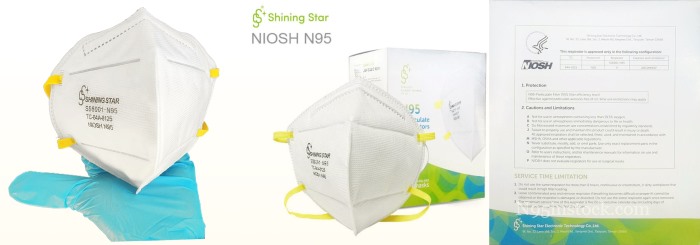Healthcare providers are conducting fits tests on N95 masks, which, like surgical masks, are designed for one-time use only, although researchers are exploring effective ways of cleaning such masks. They are called N95 masks because they are designed to block 95% of particles or fluids that might get into the face. N95 masks can facilitate breathing, but while wearers are doing that, they are also breathing in germs into the air around them.
N95 respirators can keep the wearer safe as well as others, but they are still scarce, and they should be reserved for healthcare workers and emergency personnel. Both surgical masks and more protective N95 respirators have been shown to prevent a variety of respiratory infections among healthcare workers; there is some controversy over which of the two is best suited to the care of patients with a variety of respiratory infections. N95 respirators and surgical masks are examples of PPE used to protect the wearer against particles or fluids contaminating the face.
Barrier face coverings are no substitutes for N95 respirators and other filtering facepiece respirators (FFRs), which provide respiration protection for the wearer, nor are surgical masks, which provide protection against liquids and particles. While it is true that homemade face coverings have more limited capacity than medical-grade masks for containment of SARS-CoV-2, they may be useful and would result in fewer deaths.
Wearing face coverings or masks has been shown to greatly reduce droplets that are released from a persons mouth, which may contain infectious particles. These masks are also capable of filtration large particles from the air, and they are capable of making sure that the wearers own droplets are not transmitted. When worn correctly, a surgical mask is designed to help block out large-particle droplets, sprays, or sprays which can contain germs (viruses and bacteria), keeping the larger particles from reaching your mouth and nose.
An N95 mask, which is a type of respirator, offers more protection than a surgical mask, as the N95 mask is capable of filtering both large particles and small particles as the wearer breathes. N95 respirators are designed to fit tight around your nose and mouth, so the air you inhale must travel through the mask; if worn properly, they can block at least 95% of smaller particles.
At the same time, some health experts are encouraging people, even those vaccinated, to wear face coverings that are more protective than cloth face coverings, including N95 or KN95 respirators, surgical masks, or dual-masking, where the surgical mask is worn underneath a cloth face covering. While cloth, reusable masks were recommended until recently, the Centers for Disease Control and Prevention (CDC) and other experts recognize the N95, KN95, or KF94 masks as providing the best protection in enclosed public spaces given how transmissible the SARS-CoV-2 Omicron variation is. Research has shown masks are a major barrier to the spread of respiratory viruses.


Best N95 face mask, KN95 masks, original source with best prices in stock on surgicaln95mask.com


Thank you for all your assistance.